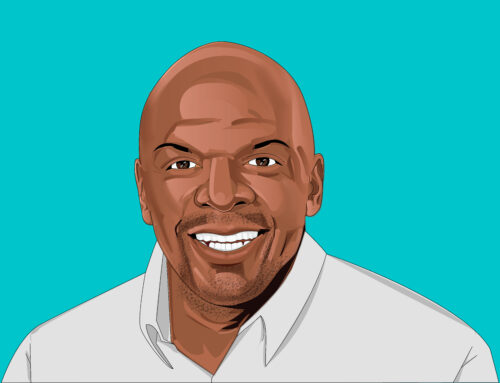Enter your information below to sign up to receive alerts on new interviews!
In this episode of Talent Chronicles, Brandon McTavish, former Head of Talent Rosetta Stone & MicroStrategy, talks the Power of Employer Branding and the Impact of Technology on Talent Acquisition. Brandon oversaw the Talent Acquisition for Rosetta during its time transitioning from a physical product to a digital subscription…. Brandon has overseen many growth initiatives and transitions over his career and tells us about all of them.
JCSI: Hey, everybody! This is Bergin Sullivan with JCSI, I’m here today with Brandon McTavish joining us for another interview in our “Talent Chronicles” series. Thanks so much, Brandon, for being here today.
Brandon: Thanks for having me.
JCSI: So, you’ve been an internationally experienced talent acquisition exec for quite some time now, experienced with both in-house as well as agency recruiting. Did you want to give us a quick background, an intro of your work experiences, and tell us how you got into talent acquisition?
Brandon: Sure. I have about 20 years of experience working in Talent Acquisition and recruiting, starting with agency work in Europe and ultimately moving in-house with companies like Ernst & Young, Barclays Bank, and other large software companies. I also worked with companies like Rosetta Stone and MicroStrategy recently in Virginia.
I fell into recruiting 20 years ago, it was not something that was originally on my radar. When I realized that as an industry, you are there to support companies in times of need, and candidates who are looking to make career transitions and tough choices on where they want their career to go, I was sold. I haven’t looked back since.
JCSI: Well, that’s great! So, how do you think technology has changed Talent Acquisition for you? Throughout your experiences, you’ve been in multiple different countries. I’m sure that working with those technologies there was also a challenge. Maybe also touch upon any changes you might foresee in the future?
Brandon: Yeah, sure. You know, technology is amazing. I was reflecting on the impact that technology has made, and as I mentioned, I started my career in Germany 20 years ago. There was probably 35 of us in the office that were all agency recruiters, and we had one computer with internet access. The technology was advanced back then, it’s just that we weren’t investing in it. LinkedIn has really had a huge impact, and there’s some fantastic Applicant Tracking Systems out there that allow you to do things proactively and can automate the candidate experience. I feel like between things like CRMs and HackerRank, they can automate and really improve the assessment and overall hiring manager experience. By reviewing the results within an ATS, they have access to a different world from where I started. There is such a greater access to candidates now, which is amazing from a recruitment perspective, if you’re a recruiter looking for candidates.
On the flip side of that, candidates, particularly candidates who are in high demands, have loads of contacts coming up regularly. So, I feel that it’s really vitally important for any company, particularly people who are working in Talent Acquisition, to improve on and continue to hone in on their employer value proposition. This is to ensure that they differentiate themselves from this myriad of messages coming to candidates that are fending off employers and proactively looking for the right fit. It has become a very one-sided experience.
The recruiters are coming out and saying, “talk to me, talk to me, talk to me” and leaving the candidates without a whole lot of information. I’ve experienced that in the past where a candidate calls me and says, “I haven’t heard anything from your recruiter for two weeks, and they were extremely interested in the beginning. What happened?” which means we would have dropped the ball. I think that technology helps those so much in terms of being able to automate and brand every step of the process by keeping the candidates informed every step of the process so they know exactly what to expect. The technology allows you to stay on track, keep things moving and ensure that candidates have a positive experience. Even if they don’t get the job, they are able to refer us as a good place to work, or at least a good place to interview as well as review positively on things like Glassdoor, which is another technology that is an important one to keep on top of.
JCSI: That’s a good point with the reviews. What do you think is important for Talent Acquisition professionals to kind of be aware of? As, the market is continuously changing, I know remote work trends are becoming obviously more popular now. As all of these technological trends come about, how can TA professionals be aware of that?
Brandon: I think there’s a lot in that question. First and foremost, a recruiter is there to support the business, help the business grow, and help business leaders make decisions on attracting and hiring the right talent to grow. Secondly, recruiters, in my opinion, are cheerleaders. We are cultural ambassadors of the company, and in both of those roles, it’s really important that we understand the business we’re supporting and understand the needs of the business. We also need to understand the technologies that the business you support uses, the market trends of those technologies, and how they’re working against your competitors on the business side. On the other side, it’s ensuring that you understand, as a recruiter, what tools do you have at your belt and in your arsenal to go out there and continue to be that ambassador to get the kind of people that you’re looking for, right?
So, anyway, I separate the two in a sense, because if you are a recruiter and you don’t understand your business, you’re not going to bring valuable insights back to those business leaders. So, when you are supporting a sales function, you need to understand what’s going on in the market within your competition landscape, and bring new market information to your managers. I always urge my recruiters to have a data-based conversation, and ask themselves, what are we seeing in the industry? Do we have the competitive technologies, and are we offering valuable skills that people in this industry want? If not, what can we do about it?
In terms of remote work, I feel like we’ve all been doing it for the last several months, so it’s a new skill for a lot of people. I think that many people were excited about it when it first started, thinking “I’m working from home 100%. This is great.” And now, I hear those same people saying “I’m ready to go back to the office.” I’ve always said that in order to be an ambassador, to be a cheerleader of a company culture, you have to experience that culture. I’ve worked in companies before where everybody is kind of an individual contributor and collaboration isn’t great, and it becomes a group of individuals working together in a company as opposed to creating a culture together. So, when you’re remote, it makes that hard.
I think it’s important that recruiters and human resources leaders understand that while this might be the new normal, that you are able to embrace those changes and talk about what it means to your company culture. As a recruiter, you have to speak truthfully and honestly about how it’s impacted your business. A lot of companies have been letting people go, or furloughing, and sales haven’t been the same unless you’re Zoom…and even they’ve had problems, right? I think that staying connected to your business, staying connected to the culture, and being able to speak to it are all skills that recruiters need to continue to work on. There are new technologies that are coming out every single day that are making recruiter’s lives easier, but you have to truly be interested in those technologies. You have to be adaptable to starting to use those technologies and continue to be curious, otherwise, you can be left behind.
JCSI: Going into your experience with Rosetta Stone, how did you hire people that can align with the rebranding that you guys were working on? I know you were transitioning from an older product into something that was a little bit more technological. That’s a pretty big change, how can that link with the company culture that you’re trying to bring on?
Brandon: Rosetta Stone was great and I loved every minute working there. What attracted me originally to the role as Head of Talent Acquisition, was that it was a global job. The company was going through a pretty big business transformation and at the time, they were selling language learning CDs, you’d buy one CD for 500 bucks and you’d have it for life. At that point in my career and in my life, I didn’t even have a CD player. So, I was intrigued when they came to me saying, they were moving to software as a service. They were new to software as a service. I think that the executives never had experience working on a subscription platform. Their technology certainly wasn’t built for it and it was a learning curve for everyone, but it was a big time of transition. So, I think that was something that really drew me to the role. When I took it, that was the first order of business to bring in Software Engineers and Salespeople who have had experience selling software as a service. We needed an executive team to think more along the lines of monthly subscriptions as opposed to one-time payments. From a financial perspective, we set the business up to be prepared to take that hit from hundreds of one-time payments a day to thousands of small monthly payments forever.
It took some time to be able to get everybody to understand. One of the things we realized was that when we were moving, it was an ideal to kind of consolidate platforms from a technology perspective. The technology recruiting was a really important part of this. We were running our different products on different platforms and some of them were very old. It was an opportunity to reevaluate and fortunately, our Chief Product Officer and Technology Teams understood that. We were able to start migrating to more relevant technologies that were not only going to be good for our customers, but also helped to attract people who wanted to keep them relevant and marketable for the future.
Nobody wants to go into an organization and learn something new, but have it be a 30-year-old program that will never be used again. So, that helped us from a technology and recruiting perspective. But, that also meant that the recruiters needed to learn it. It’s important to understand that market, what attracts candidates in that market and then, what do we have to sell to those candidates in a very truthful and honest way.
JCSI: Those are all pretty interesting points. Going off of that transition period that we spoke about, what kind of tools and strategies did you use, or develop, to ensure that you’re bringing on the right people to the company? Also, making sure that the onboarding process was effective and that they could serve as a solid, long-term employees for the firm?
Brandon: I like that question, I mean, because it’s relevant to everything we’ve already been talking about. In the last few companies that I’ve worked in, I’ve been responsible for talent acquisition and culture, and to some extent, learning and development. I brought the same approach to both roles, although drastically different companies with different products and different missions. What I’ve had to do is really boil down, what is our company culture? What is our employee value proposition? What are the competencies that make people successful?
It’s really interesting, particularly, looking at the two companies and the competencies that will evaluate each company. There are buzzwords that you can say for any company, but the process that we went through to get to the bottom of what makes people successful had completely different results. So, it was very interesting to see what competencies made people successful. I think I mentioned the word curiosity before, which was a competency we identified. What we did is boil it down to the key five, six, seven competencies that made people successful and tied them in with the mission and vision of the organization. Then, we came up with behavioral-based questions that could help us understand how candidates have behaved in past situations, which helped us understand how they would potentially react to situations they could face in our company. At this point, we’ve put together complete behavioral interview guides for each different business unit. We do this because some of the competencies are core competencies for the whole company while some are baseline skills competencies that are different within each business unit.
You can look them and as a recruiter, you can evaluate candidates against them, but then you also need to train your managers and anybody who’s involved in any part of the interview process to do that. We had to align the interviewers to ensure that we had a proper consistent process, not only about how we interview but how we evaluate. In both of the last organizations, we were very process-driven to ensure that we follow the evaluations. It’s fair, and it also gives a very objective view to when a candidate answers questions about how to evaluate those candidates against one another. It pushes out things like biases, such as “I went to the same school with this person, so therefore they’re great” and just keeps it to the basic competencies that are right for this role.
Anyways, I think it’s all about the data and by putting those processes in place, you get to a very rich set of data to make consistent decisions off of. That way, by the time you make your decision for the candidates, you have so much information on them that you can help them onboard. Not only did we organize a very robust orientation for day one and two, but also a six-month onboarding ramp-up so that we know what they needed and when. We made sure to partner with each business leader to ensure that we knew what those milestones were. Looking at the data, it’s pretty cool that you can see people who’s been successful and see the key elements to their orientation and onboarding experience, as opposed to those who have been unsuccessful and not had those. A lot of that comes with how hands-on the orientation is as well as how hands-on their manager is in that orientation and onboarding experience. I guess you could say that we went through a lot of processes to find out what those things were, but they come in as valuable tools when getting people started.
JCSI: I like those points of customizing the experience too depending on what section of the firm they’ll be in as well. Now, diving a bit more into the hiring itself while you’re interviewing the candidates, or while you have your contacts interviewing the candidates, how can they determine the enthusiasm about the company that the candidate might have? You had mentioned those behavioral questions, and people are going to have different responses to different questions as well as interpret things differently. So, how can you read those answers effectively and evaluate them to make sure that they do align with what you’re trying to get out of the candidate?
Brandon: I get this question a lot. When giving interviewing training to people that have never interviewed before, or experienced managers, they want to know “How do I know they’re telling me the truth?” It’s hard to evaluate whether somebody is telling you the truth or just giving you a very general answer that seems to tick all the boxes. Within each of those competencies that we look for, there are skills, right? This is where I always urge people to dive deeper when they’re interviewing.
Starting at the top, with questions that contain “Tell me about a time when you experienced this”, you have to add follow-up questions depending on where the conversation is going. You want an interview to be conversational, but also make sure that you’re getting real answers from the candidates. An example follow-up question would contain “How did you handle that situation” or “What did the resolution look like” so that you avoid leaving it at face value. There is an element of passion and excitement that any candidate should potentially bring to an interview or to an organization. I’ve interviewed people before that say the right things, but it’s clear that they don’t really know what we do. They’re just looking for a job to meet their title criteria. So, I think that I would expect any candidate, if they’re truly interested in us, to make an impact on me by doing their research and want to work with us.
I guess that’s a different story between a passive candidate, I am selling the opportunity to, versus a candidate who’s applying for a job. But, I think that when you look at the mission and vision of a company in an interview, the company values are sprinkled throughout that interview process. You can talk to a candidate and see if their excitement around the data points that make the day-to-day job are there. If you are talking about these data points and they’re bored, clearly they’re not the right one for the job. Some people interview really well, but that’s why it’s important to not give up on face value and dig in.
JCSI: Right, taking that deeper dive. As a last question here, going forward, what are some top trends you might see coming in Talent Acquisition? Or any final points you want to cover that we didn’t get to share?
Brandon: We’re living through a really interesting time, and I feel like between being on lockdown for the last several months, the protests that we’re seeing and demonstrations right now on Black Lives Matter, and even starting with the Me Too movement a couple of years ago… Talent Acquisition in companies, has a responsibility to their employees. You will see, and are seeing, some true leaders arise in how they’re handling and embracing these conversations. Not only in public, but in private behind closed doors with their employees. Some leaders are truly exceptional in the way they’ve been handling it, and some are not.
I think that the way things are going to be handled and should be handled going forward, should be with a very open, honest and truthful dialogue, self-reflection, and the courage to have that conversation. That trickles its way all the way down to Talent Acquisition, and in some respects, can start through Talent Acquisition. There are so many technologies, tools and processes that a lot of companies don’t follow that can help with these initiatives and conversations, such as Unconscious Bias Training.
There are also a lot of tools that can help reduce bias in job descriptions to help things like male-dominated job descriptions that women will not apply for. Other tools I’ve seen, help with blind resumes, so you see the core basics that are important to a candidate’s suitability for a job without seeing things that may create bias in a recruiter/manager. I think you’ll start to see more of these things become more prevalent whereas they may have been there before, they’ll now be top of mind and within conversations of TA leaders and CEO’s while making decisions.
Beyond that, I think there are other tools that just make it easier to evaluate candidates. Right now, in the United States along, tens of millions of people are unemployed. In May of 2018, if you’d opened a position, you might’ve gotten 15 or 20 responses as a recruiter. Now, when companies start to open up positions again, I feel like you’re going to get 200-300 responses for a position. A lot of companies are not going to be prepared for that. A team who’s got one recruiter handling 200 responses for each job is not going to be in a good position to offer a positive candidate experience. How do you tell your top 10 that they’re top 10, and what do you do with the remaining 290 who applied and who would be good for other positions? I feel that companies who are investing in CRMs, texts-related for evaluation tools and assessments, are going to come out better.
JCSI: Those are all really great points. Thank you so much for joining us here today, Brandon! We really appreciate all the insights that you gave, explaining your take on Talent Acquisition, and how you got to where you are. Thanks again for joining us in our “Talent Chronicles” series!
Brandon: Awesome, thanks for having me! I really appreciate the opportunity.
Talent Chronicles is brought to you by JCSI, an innovative recruitment consultant that delivers better hires, faster, and at less cost.




